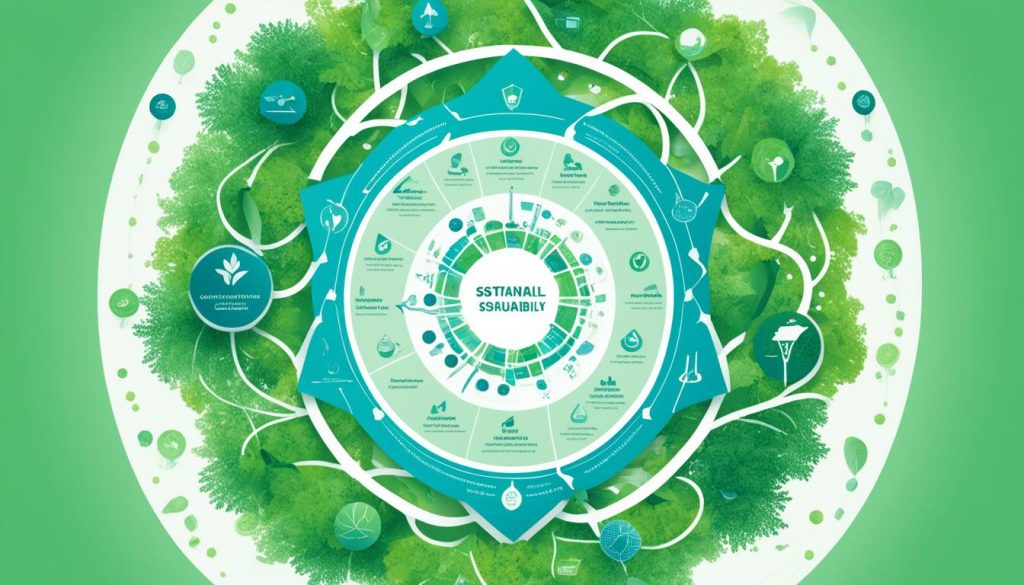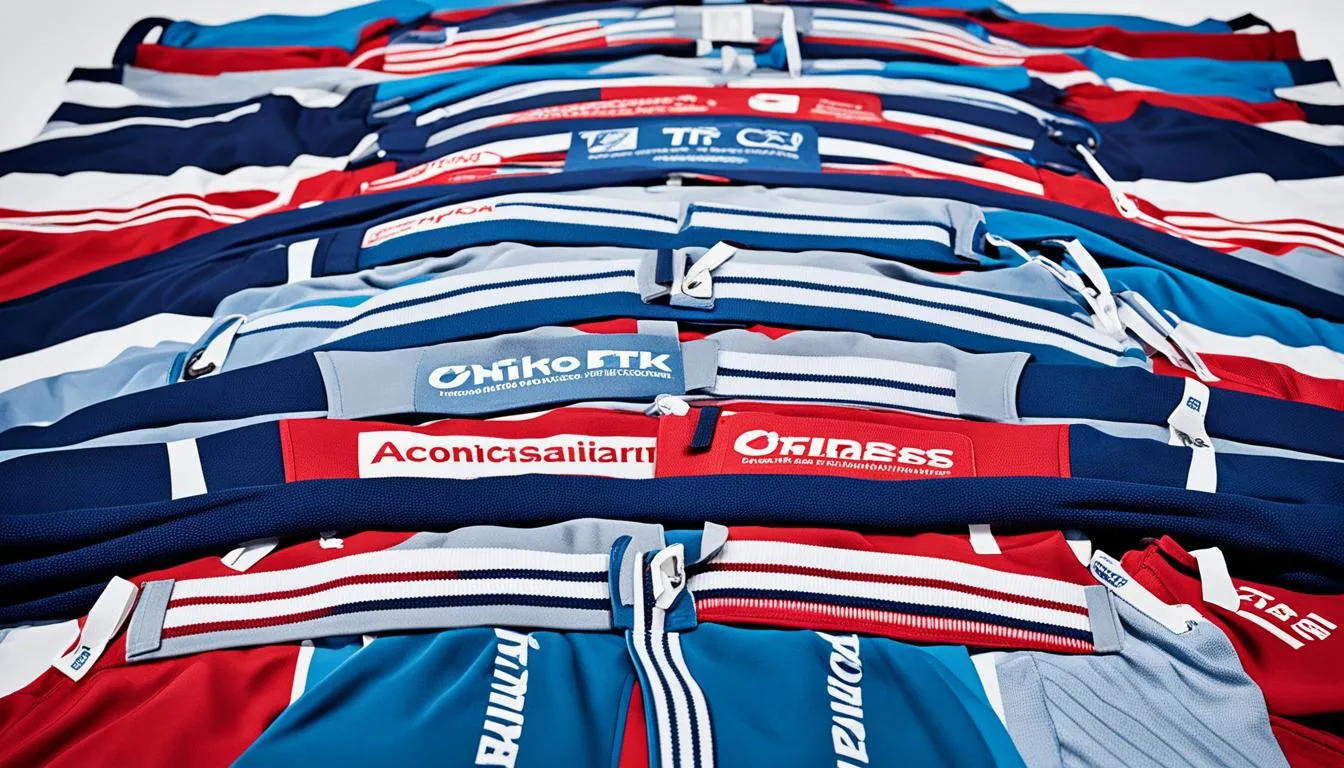Best Practices for Communicating Supply Chain Ethics to Consumers
Connect With Us Today
Consider us for your next production run. Why wait? Send us your questions here.
We know how critical Supply Chain Ethics are in building Consumer Trust. A huge 93 percent of customers think social and environmental issues matter more now. So, we need to clearly show our commitment to Ethical Sourcing Communication.
The way we work with partners, treat workers, and protect the environment is being closely watched. Addressing these issues right is key to keeping consumer trust and loyalty.
Key Takeaways
- Amplify transparency regarding social and environmental responsibility to align with consumer values.
- Enhance stakeholder engagement for continuous improvement in Supply Chain Ethics.
- Implement technology to gain deeper insights into the supply chain and improve visibility.
- Make Ethical Sourcing Communication a core part of your brand’s narrative.
- Address consumer demand for traceability and the origins of product ingredients.
- Proactively manage risk through Blockchain and AI-driven supply chain risk software.
- Strengthen your market position by showcasing ethical supply chain practices.
The Growing Demand for Ethical Supply Chain Transparency
Today, people want to know more about where their products come from. They expect transparency in supply chains and ethical practices. This is not just a passing trend. It shows how much consumers care about the ethics behind their purchases.
Companies that share their social responsibility efforts gain trust. They are not just answering a demand but also building a strong brand for the future.
Consumer Expectations for Ethical Practices
Nowadays, buyers prefer brands that are open about their supply chains. When companies show they are ethical, it sends a strong message. This change comes from people wanting companies to be responsible and sustainable.
The Impact of Transparency on Brand Reputation
Being transparent is not just the right thing to do; it also sets a company apart. When a brand is honest, its reputation grows. This leads to loyal customers who support the brand because they believe it’s ethical.
Understanding the Ethical Values that Drive Consumer Decisions
Understanding what ethically motivates buyers is crucial. We need to tell stories that not only inform but also connect with our audience. This helps consumers make choices based on ethics.
| Ethical Aspect | Consumer Expectation | Brand Opportunity |
|---|---|---|
| Labour Practices | Fair treatment and safe working conditions | To demonstrate social responsibility and humane treatment of workers |
| Environmental Footprint | Reduction of carbon footprint and sustainable resource use | To showcase commitment to environmental stewardship |
| Material Sourcing | Use of ethically sourced materials | To align brand stories with ethical sourcing and gain consumer trust |
Developing an Ethical Supply Chain Communication Strategy
At Amazon, we focus on making eco-friendly choices and telling our customers about them. This helps us connect with shoppers who care about values. Our goal is to share our ethical practices while building strong customer relationships.
The Public Relations Society of America (PRSA) Code of Ethics highlights the importance of honesty and ethical behavior. We follow these guidelines in our supply chain to keep information accurate and maintain trust. In 2022, we examined over 5,592 suppliers, checking everything from workers’ rights to their business ethics.

Identifying issues in our assessments leads to meaningful talks for improvement. We conduct audits to make sure solutions match our ethical standards. This process shows our dedication to a responsible supply chain.
We align our actions with PRSA’s values like honesty and fairness. This earns trust from our suppliers and customers. Our ethical approach ensures loyalty from all parties involved.
Our Supply Chain Standards include fair pay and focusing on workers’ health. These standards, reviewed every three years, show our commitment to ethics. Transparency is crucial, shown in our updated supplier list and supply chain map, latest in July 2023.
| Supply Chain Aspect | Amazon Commitment | Industry Benchmark |
|---|---|---|
| Labor Rights | Assessments for fair pay, safe working conditions | Basic compliance with labor laws |
| Health and Safety | Robust assessments, emergency preparedness | Minimal health and safety standards |
| Environmental Performance | Environmental impact reviews, reducing carbon footprint | Limited or no environmental initiatives |
| Ethics in Business | Transparent practices, nondiscrimination policies | Varied disclosure and ethical practices |
Our results from supplier assessments underline the need for more than just compliance. We aim for proactive sustainable sourcing. It means being open about our practices and inviting consumers to join our ethical sourcing journey.
Integrating CSR into Supply Chain Narratives
Corporate Social Responsibility (CSR) is key in today’s business world. It shapes how people see brands and their value. Aligning CSR with supply chain actions is not just about better public images. It’s about embracing values for the whole product lifecycle. With Ethical Sourcing Communication, we tackle supply chain challenges. This promises more honesty and responsibility.
Defining Corporate Social Responsibility within the Supply Chain
Building a strong Ethical Sourcing Communication plan shows our commitment to good practices. It starts with educating our suppliers. Then, it goes to caring for our environment and promoting fair work.
Research backs our focus on responsibility. With more than half valuing the environment more now, we balance our business focus. Almost half of customers pay more for sustainable products, showing CSR’s importance.
Case Studies: Successful CSR Integration and Communication
Looking at CSR in action, Microsoft stands out. It has a global network of suppliers all following a strict code of conduct. It’s a code that includes human rights, backed by groups like the Responsible Business Alliance (RBA). They also work with the Responsible Minerals Initiative (RMI) for ethical mineral sourcing.
We aim for the highest Ethical Sourcing and CSR standards. Training on ethical sourcing and using OECD Due Diligence Guidance are key. These are vital for transparency and integrity in our supply chains.
Technology, like blockchain, helps firms minimize disruption and be more eco-friendly. We’re excited to explore these innovations.
We think a credible supply chain story is built on clear communication and sound policies. Using new tech shows our strong support for Corporate Social Responsibility. It’s essential for Ethical Sourcing Communication today.
Best Practices for Communicating Supply Chain Ethics to Consumers
Consumers now prefer companies that care about social and environmental responsibility. This has made combining consumer engagement strategies, ethical supply chain messaging, and efforts in consumer trust building essential for businesses. A huge 93% of consumers consider social and environmental issues very important, which affects their buying choices. By communicating clearly and openly, businesses can build trust with these consumers.
Creating Clear and Engaging Messages
With 88% of consumers looking into a brand’s sustainability before buying, our messages must be easy to understand and interesting. It’s important to show what we stand for and the positive changes we’re making. Although many companies know mainly about their direct suppliers, technology helps us learn more about our supply chain. This allows us to share a fuller story with our customers.
Utilizing Omnichannel Engagement for Broader Reach
Using an omnichannel strategy helps us reach more consumers. By sharing our ethical supply chain efforts across various platforms, we make sure consumers get a consistent message. Technologies like blockchain improve this transparency, showing the history of our products. And, by using software to monitor supplier risks, we can quickly fix problems. This builds trust by showing we are always on the watch and proactive.
Recent studies highlight the importance for big companies to be responsible across their supply chains. Our plan is to work closely with our suppliers. By spreading ethical practices and encouraging our buyers to support these values, we improve sustainability. This makes our supply chain ethics more genuine to our customers.
Consumer Trust Building Through Ethical Messaging
Exploring Ethical Supply Chain Messaging reveals that building Consumer Trust takes time. It involves clear transparency, ethical behaviors, and a strong commitment to our values. These aspects connect deeply with consumers, helping to build their trust in us. Through ethical messaging, we show our brand’s integrity and our drive to positively impact society.
PRSA Code of Ethics to guide our ethical supply chain decisions. Although how we enforce it may vary, its core principle of ethics remains the same. We aim to do more than just meet regulations; we strive for honesty, expertise, and loyalty in everything we do.
Honesty and accuracy are key to earning consumer trust. Being transparent about sponsors and financial interests lets us communicate openly and ethically with our customers. Promoting fair competition and avoiding conflicts of interest position us as ethical leaders. Yet, we must also focus on personal growth and report ethical issues to protect our profession’s reputation.
This reflects how our values align with the PRSA’s, showing our dedication to ethical supply chain practices:
| PRSA Core Value | Our Ethical Practice |
|---|---|
| Advocacy | We advocate for suppliers and partners who share our ethical standards. |
| Honesty | Our supply chain stories are told with openness, always speaking the truth. |
| Expertise | We continuously learn about sustainability to improve our supply chain. |
| Independence | Our decisions are made objectively, free from bias. |
| Loyalty | We gain loyalty by acting in line with consumer ethical expectations. |
| Fairness | We ensure fairness, promoting equality in our supply chain. |
When faced with unethical acts like spreading rumors or conflicts of interest, we respond with ethical discipline, not retaliation. This approach fosters trust that lasts, building strong consumer relationships based on mutual respect and ethical practices.
As we focus on Consumer Trust Building, we realize every ethical decision and transparent action is important. It helps create a strong bond with our customers. In this ethical environment, Ethical Supply Chain Messaging flourishes. It’s driven by the belief that doing good also means doing well.
Ethical Sourcing Communication and Storytelling
In an era where 93% of consumers see social and environmental responsibility as a paramount concern, our approach to Ethical Sourcing Communication is more critical than ever. We believe in the captivating power of storytelling to make Supply Chain Transparency not only visible but also engaging.

With 88% of consumers considering the sustainability impact of a business and its partners before making purchases, we recognize the need to elevate our narrative. We showcase the supply chain journey through stories that highlight the commitment behind every product.
The Role of Storytelling in Ethical Sourcing Communication
Storytelling does more than share facts; it evokes feelings and builds connections. By mixing Ethical Sourcing Communication with relatable stories, we let our customers see the hard work behind responsible sourcing. This also shows the positive changes it brings to society.
Illustrating the Supply Chain Journey from Source to Consumer
Showing the journey from source to consumer is key to Sustainable Sourcing Communication. It improves understanding of the complex steps involved. This also highlights our role in keeping ethical standards high in every part of the supply chain.
| Consumer Insight | Response in Communication |
|---|---|
| Consumers demand full transparency from Tier 1 suppliers and beyond. | We strengthen our supplier visibility with technology, providing details on materials, processes, and labor conditions. |
| Technology, including Blockchain, is reshaping expectations for supplier information. | By adopting Blockchain services, we offer real-time insights into our supply chain, fostering trust through digital transparency. |
| Concerns about irregularities and unethical practices can halt shipments. | We leverage AI and machine learning in risk software to monitor and take proactive measures against such vulnerabilities. |
| Consumers want brands that are as invested in ethical supply chains as in the products themselves. | We market our ethical sourcing standards and ESG achievements as key differentiators highlighting our commitment. |
In essence, we thoroughly blend Supply Chain Transparency into our brand’s story. Startups are especially focused on ESG and ethical sourcing – aspects that matter to today’s thoughtful consumers. This ensures our story not only reaches our customers but also earns their trust and respect.
Challenges and Solutions in Supply Chain Ethics Disclosure
Looking into Corporate Social Responsibility Communication is complex. It’s not only about sharing info. It’s about dealing with ethics in our global world.
Addressing Language and Cultural Nuances Ethically
We know that language and culture affect how we see ethical standards. The UK and California have laws for supply chain checks to stop human slavery. It’s our job to understand our suppliers’ cultures to share our CSR policies well.
Navigating Legal Compliance vs. Ethical Commitment
Legal standards are where we start, not where we finish. The Dodd-Frank Act makes us check where minerals come from. It shows legality isn’t the same as morality. We talk to our suppliers to go beyond just the law.
Nestle showed the way in 2019 by sharing data on 95% of its goods. Patagonia keeps staff because of its ethical commitment. Transparency helps keep talent, improve engagement, and build trust. Especially with customers who care about ethics.
We also want to attract impact investors and skeptical consumers. Our goal is to improve efficiency and cut costs. Even though it’s tough, we seek to balance transparency and profits.
- Transparency enhances reputation and stakeholder engagement.
- Transparent companies attract ethical-minded talent.
- Consumer trust is bolstered by increased supply chain visibility.
- Operational value and cost savings are potential dividends of transparency.
We do more than just comply with laws. Our ethical work in the supply chain helps us reach higher corporate goals.
Engaging Consumers with Sustainable Sourcing Communication
Nowadays, a huge 93% of shoppers know how crucial social and environmental issues are. That’s why our commitment to sustainable sourcing communication remains strong. We get that 88% of our customers think hard about sustainability before they buy. So, it’s our job to really connect with them by highlighting our ethical sourcing efforts.
Highlighting Environmental Benefits of Ethical Sourcing
We’re using cool tech like IoT sensors and blockchain for better transparency about where our products come from. This effort makes every part of our supply chain clearer, from the first to the third supplier, and makes sure we follow U.S. laws. Our focus on ethical sourcing also helps us manage risks and spending better, showing how we’re helping the planet.
This approach shows we’re more than just sellers; we’re committed to doing right by the planet and our customers.
Creating Consumer-Centric Content for Sustainability Awareness
We believe that a well-informed customer is key to achieving sustainability. Like startups, we see ethical sourcing as a way to stand out and connect with you. The rise in supply chain risk software use proves tech helps us keep an eye on sustainability. By using these tech advances, we show our dedication to the environment and invite you to join us in making a difference.
FAQ
What are the best practices for communicating supply chain ethics to consumers?
How important is supply chain transparency to today’s consumers?
What are consumer expectations for ethical practices within supply chains?
What role does CSR play in supply chain narratives?
How can companies effectively utilize omnichannel engagement to convey their ethical sourcing practices?
How does ethical supply chain messaging build consumer trust?
What is the impact of storytelling in ethical sourcing communication?
How should companies address language and cultural nuances ethically?
What are the challenges of legal compliance versus ethical commitment?
How can companies engage consumers with sustainable sourcing communication?
Why is creating consumer-centric content for sustainability awareness important?
Source Links
- https://www.forbes.com/sites/jonchorley/2022/08/31/building-ethical-supply-chains/
- https://www.oracle.com/scm/supply-chain-transparency/
- https://www.prsa.org/about/prsa-code-of-ethics
- https://sustainability.aboutamazon.com/human-rights/supply-chain
- https://www.ibm.com/topics/supply-chain-transparency
- https://www.microsoft.com/en-us/corporate-responsibility/supply-chain-integrity
- https://hbr.org/2020/03/a-more-sustainable-supply-chain
- https://mitsloan.mit.edu/ideas-made-to-matter/supply-chain-transparency-explained
Latest News
How Collaboration Shapes Consumer Preferences in Sportswear
Navigating Consumer Rights and Warranties in Sportswear Sales
Artificial Intelligence in Fashion Forecasting and Trend Analysis
The Shift Towards Inclusive Sizing in Sportswear: Consumer Reactions
The Global Expansion of Luxury Sportswear Brands
From Sketch to Gym: The Design Process of Fashionable Sportswear
Understanding the Role of Trade Associations in Sportswear Compliance
How Economic Trends Influence Consumer Spending on Sportswear
Learning from Successful Global Market Entries
Best Practices for Managing Cross-Cultural Teams
Using Technology to Fight Counterfeit Fashion Products
Carbon Nanotube Fabrics for Superior Strength and Flexibility
The Growth of Fitness Tracking Apparel in Health and Wellness
Exploring the Influence of Social Proof in Sportswear Purchasing
Strategies for Managing Compliance in a Multinational Operation
Trends in Global Footwear: Performance Meets Lifestyle
The Role of Artificial Intelligence in Tracking Supply Chain Operations
Evaluating the Success of Sportswear Collaborative Projects
Evaluating the Potential of Emerging Markets
Global Shifts Towards Gender-Neutral Sportswear
Share This Article
Latest Articles



















